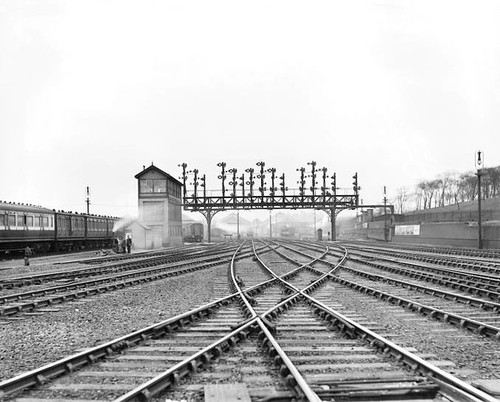But this was not the first signal box at Crewe South Junction to use power operation of points and signals. Between 1896 and 1907, the railways around Crewe were rebuilt and expanded. F. W. Webb and A. M. Thompson developed the 'Crewe' All Electric System for use at important signal boxes. A number of signal boxes around Crewe, including Crewe South Junction, were equipped with this system which featured electric operation of points and electric operation of fairly standard looking LNWR lower-quadrant semaphore signals.
The diagram below shows the arrangements at Crewe South Junction after 1907.
 Click here for larger version
Click here for larger versionDiagram of the lines controlled by Crewe South Junction.
This diagram appeared in the book 'Power Railway Signalling' [Reference 1], together with similar diagrams for Crewe North Junction and Salop Goods Junction.
The installation included a marvellous Pratt truss signal gantry spanning the main lines just outside the signal box, shown in the picture below. I think the gantry itself survived the 1940 rebuilding - with all the semaphore signal dolls removed, the gantry was equipped with colour light signal heads and route indicators.
 Click here for larger version
Click here for larger versionCrewe South Junction, looking north towards the station, in 1916 (Photo: National Railway Museum)
The post Crewe North Junction History outlines the succession of signal boxes at the north end of Crewe station, starting in 1863, but I don't know about early arrangements at Crewe South Junction. Can anybody help?
References
[Reference 1] 'Power Railway Signalling' by H. Raynar Wilson, published c1908, reprinted in two parts by P. Kay (ISBN 1 899890 00 9).
